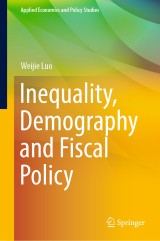Details

Inequality, Demography and Fiscal Policy
Applied Economics and Policy Studies
|
117,69 € |
|
| Verlag: | Springer |
| Format: | |
| Veröffentl.: | 26.06.2023 |
| ISBN/EAN: | 9789819905188 |
| Sprache: | englisch |
Dieses eBook enthält ein Wasserzeichen.
Beschreibungen
This book aims to empirically and theoretically study how income inequality and demographic change affected fiscal policy and subsequent economic growth globally in the past decades from four perspectives. First, it briefly reviews the dynamic changes of income sources that contribute to inequality. Second, it distinguishes between income inequality induced by differences in labor productivity and income inequality induced by differences in capital income. Third, it briefly reviews the dynamic changes of tax composition in the age of demographic change. Last, it discusses the impacts of changes in age structure on the extent of taxes on income relative to expenditure. This book offers a comprehensive discussion to understand and analyze the reason, performance and challenge of fiscal policy and economic growth from the perspective of inequality and demographics.<div>In addition to students, teachers and researchers in the areas of equity, demography, political economy and economic policy, this book is also of great interest to policy makers, planners and non-government agencies who are concerned with understanding and addressing poverty-related and aging-related issues in developed and developing countries.<br></div><div><br></div>
Inequality and the Size of US State Government.- Inequality and Government Size: A Political Economy Theory and OECD Evidence.- Inequality and Government Debt.- Population Aging and the Composition of Taxes: A Political Economy Theory.- Population Aging and the Composition of Taxes: Evidence from International Panel Data.
<div><div><div>Dr. Weijie Luo is an associate professor in economics at Beijing International Studies University (BISU). Prior to joining BISU, Dr. Luo was an associate professor in economics at the Central University of Finance and Economics, and an associate lecturer in economics at the University of York, where he completed his PhD in economics. He also served as a visiting researcher at the University of Cambridge in 2018.</div><div><br></div><div>His research interests are in macroeconomics, political economy and economic policy. His research work has been published (or accepted for publication) in journals such as Applied Economics, Economics Letters, International Review of Financial Analysis, Pacific-Basin Finance Journal, etc. He is currently serving as an anonymous referee in journals such as Scottish Journal of Political Economy, World Development, etc. One of his papers won the first prize award for the best PhD paper at the 49th Money Macro and Finance Annual Conference.</div></div></div><div><br></div>
This book aims to empirically and theoretically study how income inequality and demographic change affected fiscal policy and subsequent economic growth globally in the past decades from four perspectives. First, it briefly reviews the dynamic changes of income sources that contribute to inequality. Second, it distinguishes between income inequality induced by differences in labor productivity and income inequality induced by differences in capital income. Third, it briefly reviews the dynamic changes of tax composition in the age of demographic change. Last, it discusses the impacts of changes in age structure on the extent of taxes on income relative to expenditure. This book offers a comprehensive discussion to understand and analyze the reason, performance and challenge of fiscal policy and economic growth from the perspective of inequality and demographics.<div>In addition to students, teachers and researchers in the areas of equity, demography, political economy and economic policy, this book is also of great interest to policy makers, planners and non-government agencies who are concerned with understanding and addressing poverty-related and aging-related issues in developed and developing countries.</div>
Introduces that income inequality is induced by differences in capital income Provides an explanation of a positive relationship between population aging and economic growth Identifies essential approach for how inequality boosts economic growth

















